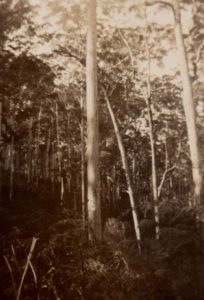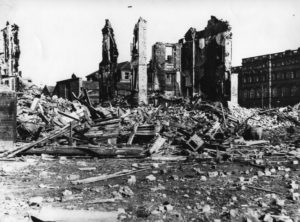 I’m not sure if I remember trudging along the narrow bush tracks, hushed except for the buzzing of bush flies in the summer heat, or whether these weekly Sunday walks were etched into my mind by the memories of my mother. It was the early 1950’s and we walked for miles, or so it seemed. I followed my mother’s desperation over the tangled roots and up every hill to try to see above the trees. We never did. Sometimes she sat and wept with frustration, wishing we could to go home.
I’m not sure if I remember trudging along the narrow bush tracks, hushed except for the buzzing of bush flies in the summer heat, or whether these weekly Sunday walks were etched into my mind by the memories of my mother. It was the early 1950’s and we walked for miles, or so it seemed. I followed my mother’s desperation over the tangled roots and up every hill to try to see above the trees. We never did. Sometimes she sat and wept with frustration, wishing we could to go home.
Again and again my father patiently pointed out that we hadn’t the money to repay the fare and remind her that this was what she wanted. She wanted follow her sister to Australia. What, in God’s name, did she expect?
‘Not this,’ my mother would cry. ‘No electricity, no water, no civilization, bloody nothing.’

We were living with my aunt and uncle on a dairy farm in the southwest of Western Australia. Where Mary had imagined open space, grew towering trees and thick undergrowth. Perth, the nearest civilization, to Mary’s mind was an insurmountable distance away for the couple who owned a bicycle between them. Terror must have clawed at her heart as she realised the recklessness of their decision to migrate to this alien place but who could blame her for seeking greener pastures? In 1948, straight after the end of the Second World War, Glasgow was a grim place to live. The city, whose name ironically means dear green place, was the target of 400 German bombers that dropped more than 500 tons of high-explosive bombs and 2,400 incendiaries on Clydebank. The once vibrant port was devastated. Only eight of 12,000 houses along the Clyde escaped damage. More than 1,000 people were killed. Fires raged and the city, already blacked by years of heavy industry, was now even blacker with piles of rubble everywhere.
Mary yearned for a better life. Her sister was off to a life of adventure in Australia and she was still on a dreary treadmill. With 35,000 people left homeless by the bombing, finding a place to live was a nightmare. Many young couples in their situation moved in with their parents, but living with either of my sets of grandparents would not have been a bag of laughs. Worn down by years of poverty and hardship, they would have watched the young couple’s every move with controlling, over-anxious eyes.

My parents eventually found lodgings in Gourock, a small village at the mouth of the Clyde, near Greenock where John grew up. It was a small, dank room with a bed and a gas burner and little else, but neither of them was used to luxury. They were on their own. That was luxury enough. Mary became pregnant with me, and the landlady who said she couldn’t abide the thought of a noisy bairn swiftly evicted them
Dad said he knew of a place – a disused air force base in the grounds of Castle Levan. The castle stood on the hill above the Cloche Lighthouse, which guarded the mouth of the Clyde. Miss Curry whose family ran the Cunard shipping line owned the estate. They peered through the window of one of the Nissan huts and Mary could see that they were cosy with curtains, beds and stoves.
Mary had misgiving about moving in. Who did the huts belong to? Dad explained the air force had left them after the war and they were lying empty, which he called a bloody disgrace. He was enraged to think that these perfectly good dwellings were going to waste while ex-servicemen and their families, who had been promised houses after the war, were homeless.
‘What about the people in the castle?’ Mary wanted to know.
‘Just one old biddy,’ replied my father, and he said, surely she could put up with a few more people on so much land.
The padlocks were cut off and thrown into the gorse and the young squatters, with some of their friends, moved in. Mary, fearless in most situations, hated openly flouting the law. She became more and more frightened as she spent long days alone while the others were at work. She didn’t dare leave the camp. The air force had posted a man on the gate. The moment the squatters vacated they could be locked out. Mary, heavily pregnant, at one stage, was stressed and having nightmares. Her only company was their dog, Molly. One day Molly was shot and killed by the farmer who rented the land. He claimed Molly was chasing the sheep, but Mary knew that he hated the presence of the squatters.
By this time, they had come to know Miss Curry, the owner of the estate, who turned out to be a very nice lady rather than an old biddy. Upset by the shooting of Molly, she spoke to the authorities. There was public sympathy for my parents’ and plight, and after a court case, they were told they could stay.
The squatting story has always filled me with pride for my adventurous and rather non-conformist parents, but life did not hold a glowing vision for the future. They had applied for a council flat in Greenock. Anyone who visits Greenock today can still see some of the great, grey, concrete towers that were the modern post-war council flats, and marvel at the contrast to our lives in Australia. If our mother hadn’t hankered after following her sister to Australia, a trip that was free for ex-servicemen, what would our lives have been like?
